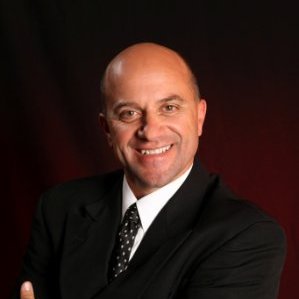
Editor: We’ve heard you have a great story about how you started your career in HR. Could you tell us how it all got started?
You could stay it’s an long, interesting road. It started back in the mid 80’s when I was in sports medicine and I was a certified athletics trainer which I did for roughly 20 years. I practiced sports
medicine at colleges when I got recuited to a start-up sports medicine clinic in central Maine which lasted 4 years, then I was recruited to do the same thing in southern New Hampshire. I was at that place for around 16 years, and at around year 10 I was asked to start up an offsite facility which was a first for the hospital. It was a little rehab clinic that did physiotherapy and even offered an x-ray service as well. The thing is though, I had never done something like this before but I went to the right sources and talked to the right people and I managed to figure it out.
 By doing all this I began to gravitate towards operations management rather than sports medicine, which then lead to VP of HR asking me to do a start-up project for her. 4 years later she needed someone to help her in the recruiting department and since I had been in the rehab world for years she thought it’d be an easy transition. I did that for 2 years then she asked me to be the director of employment for basically the whole healthcare organization, which was approximately 2500 employees.
By doing all this I began to gravitate towards operations management rather than sports medicine, which then lead to VP of HR asking me to do a start-up project for her. 4 years later she needed someone to help her in the recruiting department and since I had been in the rehab world for years she thought it’d be an easy transition. I did that for 2 years then she asked me to be the director of employment for basically the whole healthcare organization, which was approximately 2500 employees.
I did that for a few more years when a local staffing agency recruited me for an operations person, an HR guy, a recruiter person. So I went there and ran a local boutique staffing firm and 2 years later, my boss and I started a new staffing agency doing government sub-contracting which then lead me to my current position as the HR director at NCAB Group USA.
People often ask, “how did you get where you did? That’s actually is a long, interesting road.” The commonality between my initial days in sports medicine to my time now in HR is very similar, even though the fields couldn’t be more different. In sports medicine, in order to be successful is to have the knowledge and the ability to build relationships quickly. Every season you had new athletes and new coaches, and at the high school level you add parents to that equation. So the challenge was to be able to create trusting relationships year round with new people every season. I’ve always had the ability to meet people for the first time, create a conversation, and build such a trust with that relationship; it’s a key element of the HR world. In HR, you’re dealing with a variety of employees, everyday. You have to try and understand who they are, have a high degree confidentiality, and trust. That’s the commonality between the two.
Editor: You briefly mentioned how you’re now the director of HR at the NCAB group. Can you tell us a little bit more about your role, and what the company culture is like?
The NCAB Group is a global entity with about 286 employees around the world. My responsibility only lies with about 50 of them here in the US, from New Hampshire, Florida, Texas, Illinois, Washington, and to southern California. My job, first and foremost, is recruiting and filling any openings we have and since we’re growing as a company, I’m a busy man! Beyond hiring, my responsibilities are onboarding all new hires, ensuring that employees are engaged, policy and regulatory procedures, and a little bit of benefits and payroll. This may come off as controversial amongst my HR peers, but I’m not your standard HR guy. I’m not doing birthday parties, I’m not your personnel department, and I’m not your complaint department. I don’t think that’s a wise use of a professional’s time, we can create a committee to do that.
At NCAB Group, we have a great company culture in that we bring all of our new hires to our main office here for a week in New Hampshire, no matter where they’re located in the US. When they’re hear we get to “indoctrinate” them and expose them to all the various departments, systems, and processes before they go back to their specific location. From a culture standpoint, this is a huge investment that we make in our employees because we have to it’s much easier to bring them here and educate them. We always make sure they have a good time as well, we put them up in a hotel for a week, take them out for dinners, take them to local sites, meet different team members. All the fun stuff!
I was onboarded for about a month and a half and I was invited to our yearly kick-off meeting over in Barcelona, Spain. My third night there I was fortunate enough to have dinner with the CEO and he asked me how I was. I told him, “I’m doing great! You’ve created something that a lot of companies pay thousands of dollars to have consultants try to figure out.” He looked at me kind of funny and said, “what do you mean?” I had told him that I’ve been in Barcelona for three days, stayed in the same hotel as everyone else and we can identify who’s apart of the conference because we had these orange lanyards. But in those three days, there has never been a moment when I’ve bumped into a group or been apart of a meeting, when somebody didn’t put up their hand and introduced themselves and talk to me.
When we start talking about people and culture, they’re critical. In recruiting, sourcing resumes is one thing, but trying to figure out from a behavioural standpoint, will they fit the culture? For us, we want people that are self-motivated, self-empowered, and invested. We have a motto here; fail fast. It’s simple. We know people make mistakes, so make them, learn from them, make corrective actions, move on, and do your best to make sure it doesn’t happen again.
Editor: We know your main focus has been in recruitment, what is it about it that made you fall in love with it?
The best analogy I can give is about fly fishing. I love to fly fish, but with it comes its unique challenges. You don’t know what the fish are going to bite on so I have to bring more than just a couple of boxes of flies. Depending on the weather, depending on water conditions, whether it’s too hot or cold, what season it is; there are a lot of variables to consider. Fish are interesting characters and they can be pretty picky at times. Candidates are the same way. The real love of recruiting or talent acquisition is the thrill of the hunt; when you offer someone a job. Even today, I still get excited when I make an offer to a potential new hire. I still run around high fiving everyone, I’m ringing the cowbell, that type of excitement. Having been a competitor and athlete in my early years I like to win. Everyone likes to win! The other side of it is, I like helping people, finding people jobs and finding them the right company that they could excel in is definitely a feel good moment.
Editor: How has social media impacted the way recruiters do their job?
Recruiting is interesting in the social media world. The fact that I was meeting people a year ago by posting ads in community Facebook, blew my mind. Look at the evolution of the big players, there was LinkedIn, Twitter was the big buzz, now Twitter has kind of slowed down and all the recruiters’ have now gravitated towards Facebook.
The thing a lot of job seekers are naïve about is that impact and power of social media that they have at their fingertips. If they brand themselves correctly and have a good professional image, on all platforms, it can better their chances of getting hired. A lot of job seekers forget that recruiters have access to a lot of these tools and you can go find just about everyone on there. It’s funny actually, I’m currently recruiting for a marketing coordinator and in their resumes they’ll say “I have a great social media presence”. Then I try and Google them, and nothing shows up!
Editor: So you’re the co-moderator of the #JobHuntChat on Twitter. Can you tell us a little bit about that, what your role is, and how it came to be what it is today?
It was started back in 2008 by Rich DeMatteo back when the economy was in the tank, and like most recruiters he found that he had a lot of candidates but not a lot of jobs. A lot of these candidates were middle-aged people that never used social media before. So he saw me and one thing lead to another and he asked me to help co-moderate it.
As you can imagine, the whole premise of #JobHuntChat is to help people with the basics: how to use social media, how to interview, how to put a resume together, etc. Now that the job market has changed and people are now more social media savvy, we’ve adapted. We have guest speakers now, we’ve brought a couple of other people to help co-moderate so there’s a unique perspective that we all bring to the various topics we have each week.
Editor: This is an odd question, but we like to ask it at the end of an interview. If you could be a superhero, which one would you be and why?
Great question! My all time favorite superhero, and I’m really dating myself here, would be Underdog. I choose him because he always came through in the end, even going though some trial and tribulations along the way. He wasn’t a big guy, he wasn’t the Hulk, he didn’t fly. He did, however, have a cape! I can equate him to how I view my career. I didn’t go to an Ivy league school; I went to a state college. I had to work through college to pay my education. I ended up in HR but along the way I helped mainstream businesses grow significantly, and grow well. I never had the business background so I learned from the school of Hardknocks. I think people might have sat back at certain times and said, “how’s that guy going to make it?” But I did! Am I ever going to be on top recruiter? Probably not. But yet, in my professional career I achieved some great successes. Nobody handed it to me. I had to work hard for it. I had to learn. When I get into operations management, I had to learn how to run a business. Being originally athletic medicine, I didn’t have a clue about spreadsheet, net profit loss, net present value, I asked the right questions, found the right resources and became successfully in all the positions I ever had. So yeah, I’d say Underdog.
